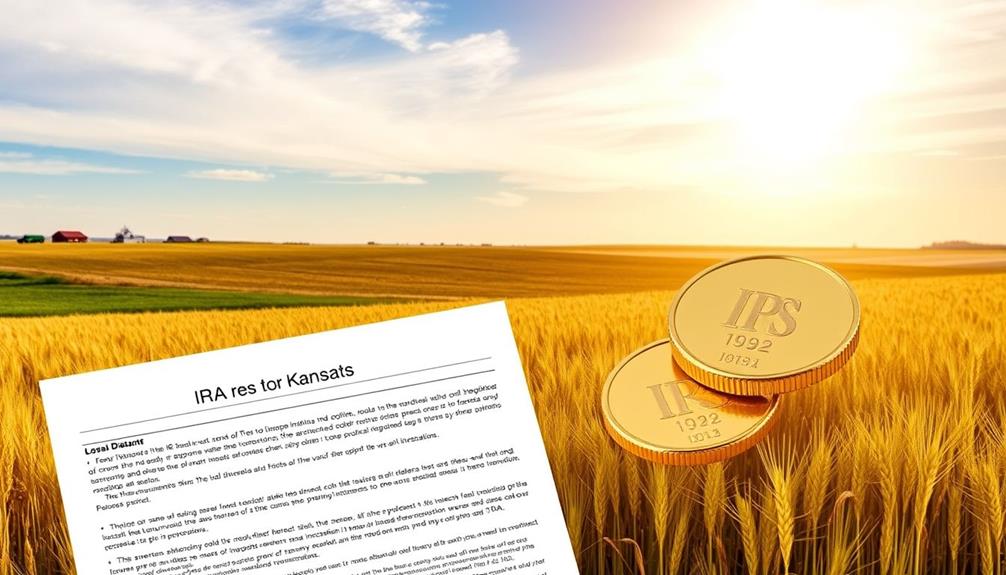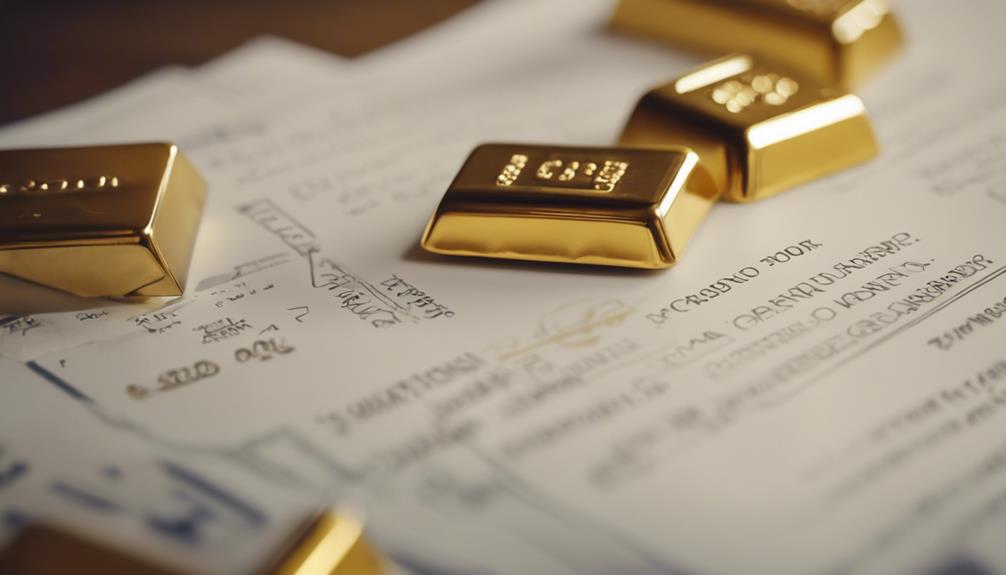If you are thinking about investing in Gold IRA in South Carolina, you will find it beneficial due to the local regulations that support your investment. It is important to ensure that your gold meets IRS purity standards of at least 99.5%. Fortunately, there are no additional taxes on Gold IRA transactions in this area. You will also enjoy tax-deferred growth and potentially lower tax obligations during retirement. Make sure to use IRS-approved custodians for secure storage in order to remain compliant. There is a lot to discover in terms of opportunities and strategies for a strong investment, so keep exploring to uncover more insights that are customized for your financial future.
Key Takeaways
- Gold IRA investments in South Carolina offer tax-deferred growth and potential for lower tax liabilities during retirement.
- Compliance with IRS regulations is essential, including purity standards of at least 99.5% for gold.
- South Carolina imposes no additional taxes on gold IRA transactions, enhancing cost-effectiveness.
- Self-Directed IRAs (SDIRAs) allow investment in precious metals, real estate, and private businesses.
- Proper custodians are required for secure storage, with options for both bank and non-bank custodians available.
Benefits of Gold IRA Investing

When considering your retirement strategy, Gold IRA investing offers numerous benefits that can enhance your financial security.
Significantly, firms like Noble Gold provide a range of precious metal investment options, ensuring you have the necessary resources and support. By including gold and other precious metals in your IRA, you create a hedge against economic uncertainty and inflation.
Historically, gold has appreciated during inflationary periods, making it a solid choice for stabilizing your investment portfolio during market downturns.
You also get to enjoy tax-deferred growth similar to traditional IRAs, with the added benefit of Roth gold IRAs allowing for tax-free withdrawals in retirement after a five-year holding period.
This flexibility can be a game changer for savvy investors looking to maximize their retirement income.
Experts recommend allocating between 5% to 15% of your portfolio to gold, as this diversification can lower overall risk and improve your risk-adjusted performance.
Gold's intrinsic value and historical resilience further solidify its reputation as a reliable asset, with returns often averaging 15% when inflation exceeds 3%.
Local Regulations in South Carolina

Maneuvering local regulations in South Carolina is essential for successful Gold IRA investing. You'll need to adhere to IRS regulations that govern precious metals, which stipulate that gold bars and coins must have a purity of at least 99.5%. This guarantees your investment meets the necessary standards for inclusion in your Gold IRA. Additionally, finding a reputable custodian and storage facility is crucial to ensure your investment is safeguarded and compliant with all legal requirements. For those interested in expanding their portfolio beyond South Carolina, exploring opportunities for a Gold IRA in North Carolina could provide broader options and potentially diversify risk. Always consult with a financial advisor familiar with both state and federal guidelines to make informed decisions.
One advantage you'll find in South Carolina is the absence of additional taxes on gold IRA transactions. This allows for tax-deferred growth, similar to traditional IRAs, helping your investment flourish without immediate tax implications.
However, it's imperative to choose IRS-approved custodians for storing your gold, as the state requires that all precious metals in IRAs are held in secure, IRS-approved depositories.
Additionally, South Carolina law mandates proper documentation and reporting of all gold IRA transactions. Staying updated on both state and federal regulations is essential, as changes could impact your investment strategies and compliance requirements.
Types of Investments in an SDIRA

Self-Directed IRAs (SDIRAs) offer a unique opportunity for investors looking to diversify their retirement portfolios beyond traditional stocks and bonds. With an SDIRA, you can invest in a wide range of asset classes, including real estate, private businesses, and precious metals. This flexibility allows you to tailor your retirement strategy to your specific goals and interests.
One of the most popular options is a precious metal IRA, where you can invest in precious metals like gold, silver, platinum, and palladium. However, be mindful of the IRS's specific purity and weight requirements for these investments.
If you're interested in expanding your portfolio further, consider investing in private businesses. South Carolina's thriving sectors, such as aerospace, automotive, and biotech, present excellent opportunities.
Real estate is another viable investment within an SDIRA. You can hold properties in historic areas or growing neighborhoods like Charleston and Columbia, potentially yielding income and tax-deferred gains.
Additionally, using an IRA LLC can streamline your investments by allowing direct management and real-time transactions, eliminating custodian delays. This way, you can efficiently navigate your SDIRA and maximize its potential for your retirement portfolio.
How to Open a Gold IRA

To open a Gold IRA, you'll need to gather the required documentation and guarantee you meet the eligibility criteria set by the IRS.
Once that's done, you can explore funding options, including contributions or rollovers, and decide on secure storage for your precious metals.
Understanding these steps will help you set up your Gold IRA efficiently.
Required Documentation and Eligibility
Opening a Gold IRA requires careful attention to documentation and eligibility criteria. First, you need to verify that the physical gold you plan to invest in meets the IRS purity standards, which typically demand a minimum of 99.5% fine gold.
To start the process, you'll need to gather the required documentation, including proof of identity, your tax identification number, and completed application forms from an IRS-approved custodian.
Investors must be aware that certain types of gold, particularly collectibles like specific coins, are ineligible for IRAs. Consequently, it's vital to purchase compliant gold from recognized dealers to avoid any issues.
Additionally, you can fund your Gold IRA through direct contributions or rollovers from existing individual retirement accounts or 401(k)s. Just remember to adhere to the IRS annual contribution limits, which are $6,500 for 2023, or $7,500 if you're aged 50 or older.
Lastly, maintaining thorough records of all transactions and guaranteeing compliance with IRS regulations is significant. This diligence helps you avoid penalties and keeps your tax advantages intact while investing in gold.
Funding and Storage Options
Before you plunge into the world of Gold IRA investing, it's important to understand your funding and storage options. To get started, you'll need to choose a qualified custodian, like Madison Trust, to manage your Gold IRA.
Your funding options include rollovers from existing retirement accounts, such as 401(k)s or traditional IRAs, as well as direct contributions, with a limit of $6,500 for 2023. Investors can avoid tax penalties by rolling over funds directly between custodians, ensuring a smoother changeover.
When it comes to storage, the precious metals in your Gold IRA must be held in IRS-approved depositories. Your custodian will arrange secure storage, but keep in mind that fees may be higher than those for traditional IRAs. It's important to research these costs, including both annual and setup fees.
Here's a quick overview of your options:
| Funding Options | Storage Options |
|---|---|
| Rollovers from retirement accounts | IRS-approved depositories |
| Direct contributions | Custodian-managed storage |
| Annual limit: $6,500 | Higher fees than traditional IRAs |
With these insights, you're ready to navigate your Gold IRA journey!
Storage and Security Considerations

When investing in a Gold IRA, understanding storage and security factors is vital for protecting your assets. The IRS requires that all precious metals in your Gold IRA be stored in IRS-approved depositories. This guarantees compliance with federal regulations and safeguards your investments.
In South Carolina, you have the flexibility to choose between bank and approved non-bank custodians for the storage of your Gold IRA assets. It's important to research various custodian services for Gold IRA management to find one that meets your needs.
Custodians play an important role by arranging secure storage and must provide regular performance reports to keep you informed. When selecting a custodian, make certain they've a solid reputation for security and reliability.
It's also important to contemplate insurance coverage for your stored precious metals. This coverage protects you against potential theft or loss that may occur while your assets are in the custody of third parties.
Tax Advantages of Gold IRAs

When you invest in a Gold IRA, you can take advantage of tax-deferred growth, meaning you won't owe taxes on your gains until you make withdrawals in retirement.
This tax advantage is especially beneficial in a volatile economy, where protecting your retirement assets is essential. If you choose a Roth Gold IRA, you'll enjoy the perk of tax-free withdrawals after meeting certain conditions, which can be a game-changer for your long-term planning.
Additionally, you can benefit from tax advantages available when rolling over 401k to Gold IRA, making it an appealing option for those looking to diversify their retirement portfolio.
Plus, with potential deductions on contributions and no required minimum distributions, you gain added flexibility and benefits in managing your retirement savings.
Tax-Deferred Growth Benefits
One of the most compelling reasons to contemplate a Gold IRA is the tax-deferred growth it offers, allowing you to postpone taxes on gains until you withdraw funds during retirement. This feature mirrors traditional IRAs, making Gold IRAs an appealing option for your retirement savings strategy.
By taking advantage of tax advantages now, you can potentially enhance your overall investment returns.
Here are some key benefits of tax-deferred growth in Gold IRAs:
- Postponed Tax Payments: You won't pay taxes on gains until retirement, freeing up more capital for investment.
- Lower Tax Brackets: Many retirees find themselves in lower tax brackets, potentially reducing your tax liability when you withdraw.
- Contribution Deductions: Traditional Gold IRAs may allow for tax deductions on contributions, further boosting your savings.
- No Required Minimum Distributions: Unlike some accounts, Roth Gold IRAs don't require minimum distributions, allowing for continued tax-deferred growth.
Roth Gold IRA Advantages
Roth Gold IRAs offer distinct tax advantages that can greatly enhance your retirement savings strategy. With these accounts, you can make contributions using after-tax dollars, allowing any earnings to grow tax-free. This means that once you reach age 59½ and have held your account for at least five years, you can enjoy tax-free withdrawals during retirement. This feature is particularly beneficial if you expect to be in a higher tax bracket later in life, as qualified withdrawals won't impact your tax liability.
Additionally, Roth Gold IRAs provide flexibility since they don't require minimum distributions (RMDs) during your lifetime. This means you can manage your withdrawals according to your needs, giving you greater control over your retirement income.
By allocating a portion of your savings to a Roth Gold IRA, you're not only diversifying your retirement portfolio but also creating a solid hedge against inflation. As the cost of living rises, the ability to withdraw tax-free funds can remarkably boost your purchasing power.
Embracing a Roth Gold IRA can be a smart move for anyone looking to strengthen their financial future.
Contribution and Withdrawal Limits
Understanding the contribution and withdrawal limits of Gold IRAs is essential for maximizing your retirement savings. For 2023, the contribution limits are capped at $6,500, with an extra $1,000 allowed for individuals aged 50 and older. This makes it easier for you to boost your retirement funds as you approach retirement age.
When it comes to withdrawals, you can take them without penalty starting at age 59.5. However, if you withdraw early, you'll face a 10% tax penalty. Additionally, the IRS requires that Required Minimum Distributions (RMDs) begin at age 73 for traditional IRAs, including gold IRAs, guaranteeing your retirement funds are eventually taxed.
Here are some key points to remember:
- Tax-deductible contributions can reduce your taxable income.
- Roth gold IRAs allow for tax-free withdrawals after five years and age 59.5.
- RMDs help guarantee that retirement funds are tapped into during your lifetime.
- Early withdrawals incur a 10% penalty, so plan accordingly.
Risks and Market Dynamics

Maneuvering the world of Gold IRA investing in South Carolina comes with its share of risks and market dynamics that you need to keep in mind. First, gold IRAs often incur higher costs compared to traditional retirement accounts. Setup, maintenance, and storage fees can greatly affect your overall returns.
Additionally, liquidity can pose a challenge; selling gold IRA assets is often cumbersome and may delay your access to funds when you need them. It's vital to recognize that compliance with IRS regulations is essential to avoid penalties and maintain tax advantages.
Market volatility is another significant factor. Gold prices can fluctuate due to economic conditions, investor sentiment, and geopolitical factors, impacting the intrinsic value of your investment. It's essential to stay informed about these dynamics. Consulting a financial advisor can provide valuable insights into market trends and help you develop a strategic plan.
Moreover, strict IRS regulations govern gold IRAs, and non-compliance can lead to penalties and the loss of tax advantages.
However, gold's positive correlation with inflation rates can make it a strategic hedge against rising costs, especially amid economic uncertainty. Balancing these risks and opportunities will be vital for your success in Gold IRA investing.
Frequently Asked Questions
What Are the Requirements for a Gold Ira?
To qualify for a Gold IRA, you need gold bullion with at least 99.5% purity, work with a qualified custodian, and store your metals in IRS-approved depositories. Collectible coins generally aren't eligible.
Are Gold IRAS a Good Investment?
Gold IRAs can be a solid investment for you. They offer a hedge against inflation and market volatility, allowing your portfolio to stabilize. Just make sure you understand the associated rules and fees before diving in.
What Is the Best Gold IRA Company?
When you're looking for the best Gold IRA company, focus on IRS compliance, customer service, and diverse metal options. Check reviews for reliable providers like Madison Trust and Broad Financial to make an informed decision.
Can I Store My Gold IRA at Home?
You can't store your Gold IRA at home. IRS regulations require it to be kept in an approved depository. This guarantees compliance, security, and access to performance reports, protecting your investment from potential penalties and risks.
Conclusion
To sum up, investing in a Gold IRA in South Carolina offers unique opportunities alongside local regulations to navigate. With the potential for tax advantages and diverse investment types, it's a compelling choice for securing your financial future. Have you considered how gold could not only diversify your portfolio but also act as a hedge against inflation? By staying informed and cautious, you can make the most of your investment while ensuring your assets are well-protected.









